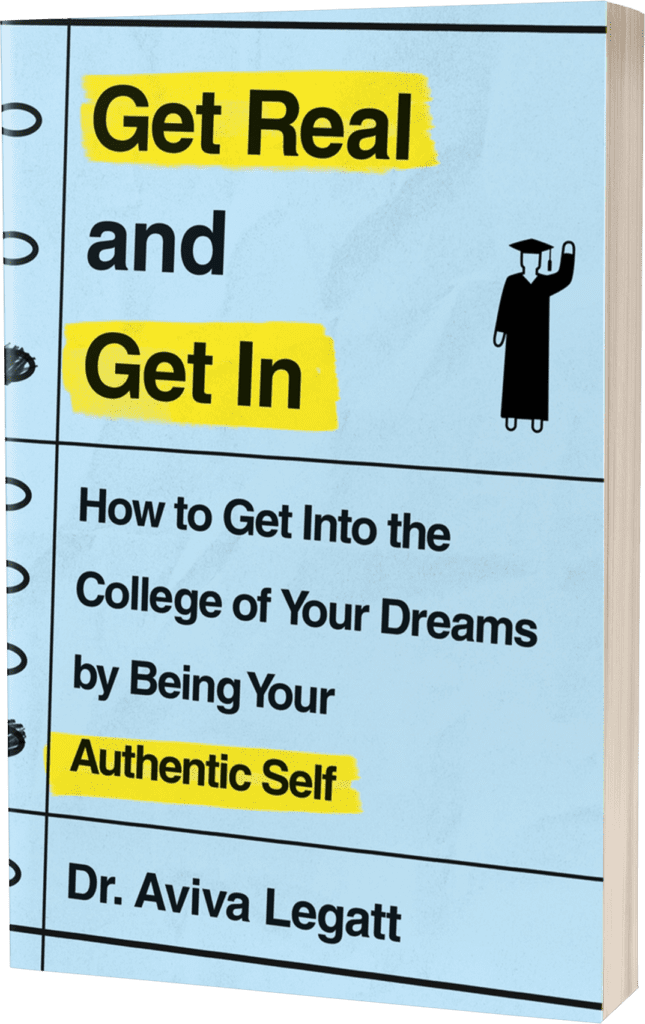How would you describe your book?
My book is an antidote for college-bound students and their parents to navigate the big questions around college and to cut through the noise of college admissions box-checking and hoop-jumping. As much as it seems that highly selective colleges hold all the power in the admissions cycle, applicants must remember their power. What kind of college experience and life do they want? How can they define and stay true to that vision, despite well-meaning adults who are quick to offer ideas about what they should want?
What do you mean by “your authentic self”?
Your authentic self is the person who you are when you following your heartfelt intentions and interests; in contrast with those dictated to you by or informed exclusively by your community, the media, and/or your family. When you are your authentic self, you are doing things that are helping you to learn and to grow on your journey. You are thinking creatively, using your intuition, demonstrating resiliency, and trying new things.
When it comes to applying to college, you have to be aware that, due to the limitations of the application itself, you cannot capture the complexity of your whole self. Being your authentic self when applying to college means that you know yourself and you know colleges. In my book, I have a framework for learning more about colleges and college culture before you apply. This allows you, the applicant, to show up authentically in your college application–you will understand what they want to learn about you so you can focus on conveying those parts of yourself in your application.
How should an applicant go about showing their authentic self?
First, choose the best-fit major. Some students are very compelled to go into something super pragmatic (e.g. business or engineering), but they don’t have any evidence of having demonstrated their interest and capability to succeed in that major. If you are a student and want to enter those fields, you might be surprised to know that there are many entry points into those fields besides those direct majors. When you apply, choose a major that is a natural extension of your experiences rather than something aspirational that you have no preparation for.
Second, research colleges through networking. Moms, you know this intuitively. If you want to get a job, you’re better positioned for the opportunity if you already know someone at the company versus if you know no one. The same principle for college admissions applies. Have your child reach out earnestly reach out to people at the college whom the student would likely connect with if actually attending (e.g. religious organization, extracurricular activity, a faculty member from a specific department). Your child can make a small ask e.g. 10 minutes of their time to answer a couple of questions that they can send over email. This outreach serves several purposes: 1) Great practice for “real world” networking skills; 2) Gives student information to use on their college supplement essays; 3) May result in a long term relationship or connection (which could include a letter of recommendation for the student). There are no guarantees when it comes to networking, but even the practice itself can build confidence and help the student to refine their goals.
Finally, as far as extracurriculars, ahead of the application process, students want to build what I call your college admissions X-factor. That stands for experience, expertise and exponential impact. Experience is the initial exposure to something, a curiosity that you pursue to see whether or not you like it. The second level is expertise; that’s when you take steps to deepen that curiosity, for example by joining a club, writing a research paper, or founding a blog. The third and highest level is exponential impact; which is when you take that knowledge and experience you have developed and you find a way to generate a positive return for as large a community of people as possible. For example, you grow your school club or organization to collaborate with other schools; you write a book; you intern with a professor; you found an organization. Exponential impact demonstrates a deep commitment to something–this is what makes you the most compelling candidate possible to colleges. Even if you don’t achieve exponential impact by the end of high school, students should aim for that level of impact to figure out who they are and what they want.



